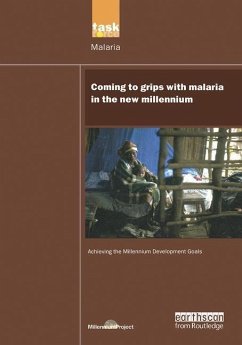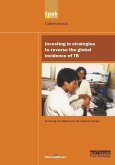Un Millennium Project
UN Millennium Development Library
Coming to Grips with Malaria in the New Millennium
Un Millennium Project
UN Millennium Development Library
Coming to Grips with Malaria in the New Millennium
- Gebundenes Buch
- Merkliste
- Auf die Merkliste
- Bewerten Bewerten
- Teilen
- Produkt teilen
- Produkterinnerung
- Produkterinnerung
- Weitere 6 Ausgaben:
- Gebundenes Buch
- Gebundenes Buch
- Broschiertes Buch
- eBook, PDF
- eBook, PDF
- eBook, PDF
Presents a strategic framework for relieving the burden that malaria imposes on society through the implementation of tried and tested anti-malarial interventions designed to improve health nationally and to promote economic development locally.
Andere Kunden interessierten sich auch für
![UN Millennium Development Library UN Millennium Development Library]() Un Millennium ProjectUN Millennium Development Library259,99 €
Un Millennium ProjectUN Millennium Development Library259,99 €![UN Millennium Development Library UN Millennium Development Library]() Un Millennium ProjectUN Millennium Development Library83,99 €
Un Millennium ProjectUN Millennium Development Library83,99 €![UN Millennium Development Library UN Millennium Development Library]() Un Millennium ProjectUN Millennium Development Library261,99 €
Un Millennium ProjectUN Millennium Development Library261,99 €![South Africa's Energy Transition South Africa's Energy Transition]() Tobias Bischof-NiemzSouth Africa's Energy Transition33,99 €
Tobias Bischof-NiemzSouth Africa's Energy Transition33,99 €![Thinking through Landscape Thinking through Landscape]() Augustin BerqueThinking through Landscape205,99 €
Augustin BerqueThinking through Landscape205,99 €![Technology Development Assistance for Agriculture Technology Development Assistance for Agriculture]() Norman ClarkTechnology Development Assistance for Agriculture67,99 €
Norman ClarkTechnology Development Assistance for Agriculture67,99 €![Nature, Choice and Social Power Nature, Choice and Social Power]() Erica SchoenbergerNature, Choice and Social Power73,99 €
Erica SchoenbergerNature, Choice and Social Power73,99 €-
-
-
Presents a strategic framework for relieving the burden that malaria imposes on society through the implementation of tried and tested anti-malarial interventions designed to improve health nationally and to promote economic development locally.
Hinweis: Dieser Artikel kann nur an eine deutsche Lieferadresse ausgeliefert werden.
Hinweis: Dieser Artikel kann nur an eine deutsche Lieferadresse ausgeliefert werden.
Produktdetails
- Produktdetails
- Verlag: Routledge
- Seitenzahl: 152
- Erscheinungstermin: 30. September 2020
- Englisch
- Abmessung: 260mm x 183mm x 13mm
- Gewicht: 494g
- ISBN-13: 9781138471849
- ISBN-10: 1138471844
- Artikelnr.: 60021793
- Herstellerkennzeichnung
- Libri GmbH
- Europaallee 1
- 36244 Bad Hersfeld
- gpsr@libri.de
- Verlag: Routledge
- Seitenzahl: 152
- Erscheinungstermin: 30. September 2020
- Englisch
- Abmessung: 260mm x 183mm x 13mm
- Gewicht: 494g
- ISBN-13: 9781138471849
- ISBN-10: 1138471844
- Artikelnr.: 60021793
- Herstellerkennzeichnung
- Libri GmbH
- Europaallee 1
- 36244 Bad Hersfeld
- gpsr@libri.de
UN Millennium Project
Foreword
Working group members
Preface
Acknowledgments
Abbreviations
Millennium Development Goals
Executive summary
1 Introduction
The Millennium Development Goal and target for malaria Organization of this report
2 The resurgence and burden of malaria
Health burden
Economic and social burden
3 Review of major initiatives and institutional policies for malaria control
Global Malaria Eradication Program
Global Malaria Control Strategy
Harare Declaration on Malaria Prevention and Control
Multilateral Initiative on Malaria
Roll Back Malaria initiative
Abuja Declaration on Roll Back Malaria
Medicines for Malaria Venture
Global Fund to fight AIDS, Tuberculosis, and Malaria
4 Malaria control strategies
Disease prevention strategies
Disease management strategies
Epidemic prevention and control strategies
Information, education, and communication strategies
Monitoring and evaluation
5 Examples of successful scale
up of malaria control programs
Tigray region of Ethiopia
Highlands of Madagascar
Viet Nam
South Africa
Tanzania
Lessons learned
6 Priority challenges fo r scaling up malaria control program s
Strengthening health systems
Human resources capacity
Social mobilization of communities
Partnerships
Programmatic challenges
7 Developing a global plan to achieve the Millennium Development Goal target fo r malaria
Conditions for achieving a sustained impact
Developing a global plan for reducing the burden of malaria
Components of a global plan
Needs assessment: costing and financing
Resource mobilization: needs assessment at the global level
Resource mobilization: needs assessment at the country level
Ethiopia
8 Monitoring and evaluation
Monitoring and evaluation of health programs
Malaria
related Millennium Development Goal, targets, and indicators
Coverage measures
Main approaches to data collection for monitoring malaria control
Monitoring the effectiveness of antimalarials and insecticides
Developing geographic information systems and remote sensing
Cost
effectiveness of service provision
Linkage of malaria monitoring with poverty alleviation
9 Research and development to meet current and future needs
Antimalarial medicine development
Malaria diagnostics
Malaria management in young children
Malaria vector
Malaria vaccines
10 Recommendations
1. Establish a realistic and measurable target on malaria
2. Enhance political commitment at country and global levels
3. Strengthen health systems at national and district levels
4. Develop human resources for program implementation
3. Promote social mobilization and community participation
6. Provide effective antimalarial supplies and commodities
7. Apply an integrated package of interventions
8. Scale up malaria control efforts to national level
9. Promote social and economic development
10. Incorporate malaria prevention and treatment approaches into school curricula
11. Develop surveillance systems for early detection of malaria epidemics
12. Promote partnerships for malaria control
13. Secure affordable access to the latest medical and therapeutic discoveries
14. Invest in research and development on malaria control tools
Appendix 1 Estimated costs of scaled
up malaria control efforts in Ethiopia ,2005
15
Notes
References.
Working group members
Preface
Acknowledgments
Abbreviations
Millennium Development Goals
Executive summary
1 Introduction
The Millennium Development Goal and target for malaria Organization of this report
2 The resurgence and burden of malaria
Health burden
Economic and social burden
3 Review of major initiatives and institutional policies for malaria control
Global Malaria Eradication Program
Global Malaria Control Strategy
Harare Declaration on Malaria Prevention and Control
Multilateral Initiative on Malaria
Roll Back Malaria initiative
Abuja Declaration on Roll Back Malaria
Medicines for Malaria Venture
Global Fund to fight AIDS, Tuberculosis, and Malaria
4 Malaria control strategies
Disease prevention strategies
Disease management strategies
Epidemic prevention and control strategies
Information, education, and communication strategies
Monitoring and evaluation
5 Examples of successful scale
up of malaria control programs
Tigray region of Ethiopia
Highlands of Madagascar
Viet Nam
South Africa
Tanzania
Lessons learned
6 Priority challenges fo r scaling up malaria control program s
Strengthening health systems
Human resources capacity
Social mobilization of communities
Partnerships
Programmatic challenges
7 Developing a global plan to achieve the Millennium Development Goal target fo r malaria
Conditions for achieving a sustained impact
Developing a global plan for reducing the burden of malaria
Components of a global plan
Needs assessment: costing and financing
Resource mobilization: needs assessment at the global level
Resource mobilization: needs assessment at the country level
Ethiopia
8 Monitoring and evaluation
Monitoring and evaluation of health programs
Malaria
related Millennium Development Goal, targets, and indicators
Coverage measures
Main approaches to data collection for monitoring malaria control
Monitoring the effectiveness of antimalarials and insecticides
Developing geographic information systems and remote sensing
Cost
effectiveness of service provision
Linkage of malaria monitoring with poverty alleviation
9 Research and development to meet current and future needs
Antimalarial medicine development
Malaria diagnostics
Malaria management in young children
Malaria vector
Malaria vaccines
10 Recommendations
1. Establish a realistic and measurable target on malaria
2. Enhance political commitment at country and global levels
3. Strengthen health systems at national and district levels
4. Develop human resources for program implementation
3. Promote social mobilization and community participation
6. Provide effective antimalarial supplies and commodities
7. Apply an integrated package of interventions
8. Scale up malaria control efforts to national level
9. Promote social and economic development
10. Incorporate malaria prevention and treatment approaches into school curricula
11. Develop surveillance systems for early detection of malaria epidemics
12. Promote partnerships for malaria control
13. Secure affordable access to the latest medical and therapeutic discoveries
14. Invest in research and development on malaria control tools
Appendix 1 Estimated costs of scaled
up malaria control efforts in Ethiopia ,2005
15
Notes
References.
Foreword
Working group members
Preface
Acknowledgments
Abbreviations
Millennium Development Goals
Executive summary
1 Introduction
The Millennium Development Goal and target for malaria Organization of this report
2 The resurgence and burden of malaria
Health burden
Economic and social burden
3 Review of major initiatives and institutional policies for malaria control
Global Malaria Eradication Program
Global Malaria Control Strategy
Harare Declaration on Malaria Prevention and Control
Multilateral Initiative on Malaria
Roll Back Malaria initiative
Abuja Declaration on Roll Back Malaria
Medicines for Malaria Venture
Global Fund to fight AIDS, Tuberculosis, and Malaria
4 Malaria control strategies
Disease prevention strategies
Disease management strategies
Epidemic prevention and control strategies
Information, education, and communication strategies
Monitoring and evaluation
5 Examples of successful scale
up of malaria control programs
Tigray region of Ethiopia
Highlands of Madagascar
Viet Nam
South Africa
Tanzania
Lessons learned
6 Priority challenges fo r scaling up malaria control program s
Strengthening health systems
Human resources capacity
Social mobilization of communities
Partnerships
Programmatic challenges
7 Developing a global plan to achieve the Millennium Development Goal target fo r malaria
Conditions for achieving a sustained impact
Developing a global plan for reducing the burden of malaria
Components of a global plan
Needs assessment: costing and financing
Resource mobilization: needs assessment at the global level
Resource mobilization: needs assessment at the country level
Ethiopia
8 Monitoring and evaluation
Monitoring and evaluation of health programs
Malaria
related Millennium Development Goal, targets, and indicators
Coverage measures
Main approaches to data collection for monitoring malaria control
Monitoring the effectiveness of antimalarials and insecticides
Developing geographic information systems and remote sensing
Cost
effectiveness of service provision
Linkage of malaria monitoring with poverty alleviation
9 Research and development to meet current and future needs
Antimalarial medicine development
Malaria diagnostics
Malaria management in young children
Malaria vector
Malaria vaccines
10 Recommendations
1. Establish a realistic and measurable target on malaria
2. Enhance political commitment at country and global levels
3. Strengthen health systems at national and district levels
4. Develop human resources for program implementation
3. Promote social mobilization and community participation
6. Provide effective antimalarial supplies and commodities
7. Apply an integrated package of interventions
8. Scale up malaria control efforts to national level
9. Promote social and economic development
10. Incorporate malaria prevention and treatment approaches into school curricula
11. Develop surveillance systems for early detection of malaria epidemics
12. Promote partnerships for malaria control
13. Secure affordable access to the latest medical and therapeutic discoveries
14. Invest in research and development on malaria control tools
Appendix 1 Estimated costs of scaled
up malaria control efforts in Ethiopia ,2005
15
Notes
References.
Working group members
Preface
Acknowledgments
Abbreviations
Millennium Development Goals
Executive summary
1 Introduction
The Millennium Development Goal and target for malaria Organization of this report
2 The resurgence and burden of malaria
Health burden
Economic and social burden
3 Review of major initiatives and institutional policies for malaria control
Global Malaria Eradication Program
Global Malaria Control Strategy
Harare Declaration on Malaria Prevention and Control
Multilateral Initiative on Malaria
Roll Back Malaria initiative
Abuja Declaration on Roll Back Malaria
Medicines for Malaria Venture
Global Fund to fight AIDS, Tuberculosis, and Malaria
4 Malaria control strategies
Disease prevention strategies
Disease management strategies
Epidemic prevention and control strategies
Information, education, and communication strategies
Monitoring and evaluation
5 Examples of successful scale
up of malaria control programs
Tigray region of Ethiopia
Highlands of Madagascar
Viet Nam
South Africa
Tanzania
Lessons learned
6 Priority challenges fo r scaling up malaria control program s
Strengthening health systems
Human resources capacity
Social mobilization of communities
Partnerships
Programmatic challenges
7 Developing a global plan to achieve the Millennium Development Goal target fo r malaria
Conditions for achieving a sustained impact
Developing a global plan for reducing the burden of malaria
Components of a global plan
Needs assessment: costing and financing
Resource mobilization: needs assessment at the global level
Resource mobilization: needs assessment at the country level
Ethiopia
8 Monitoring and evaluation
Monitoring and evaluation of health programs
Malaria
related Millennium Development Goal, targets, and indicators
Coverage measures
Main approaches to data collection for monitoring malaria control
Monitoring the effectiveness of antimalarials and insecticides
Developing geographic information systems and remote sensing
Cost
effectiveness of service provision
Linkage of malaria monitoring with poverty alleviation
9 Research and development to meet current and future needs
Antimalarial medicine development
Malaria diagnostics
Malaria management in young children
Malaria vector
Malaria vaccines
10 Recommendations
1. Establish a realistic and measurable target on malaria
2. Enhance political commitment at country and global levels
3. Strengthen health systems at national and district levels
4. Develop human resources for program implementation
3. Promote social mobilization and community participation
6. Provide effective antimalarial supplies and commodities
7. Apply an integrated package of interventions
8. Scale up malaria control efforts to national level
9. Promote social and economic development
10. Incorporate malaria prevention and treatment approaches into school curricula
11. Develop surveillance systems for early detection of malaria epidemics
12. Promote partnerships for malaria control
13. Secure affordable access to the latest medical and therapeutic discoveries
14. Invest in research and development on malaria control tools
Appendix 1 Estimated costs of scaled
up malaria control efforts in Ethiopia ,2005
15
Notes
References.








